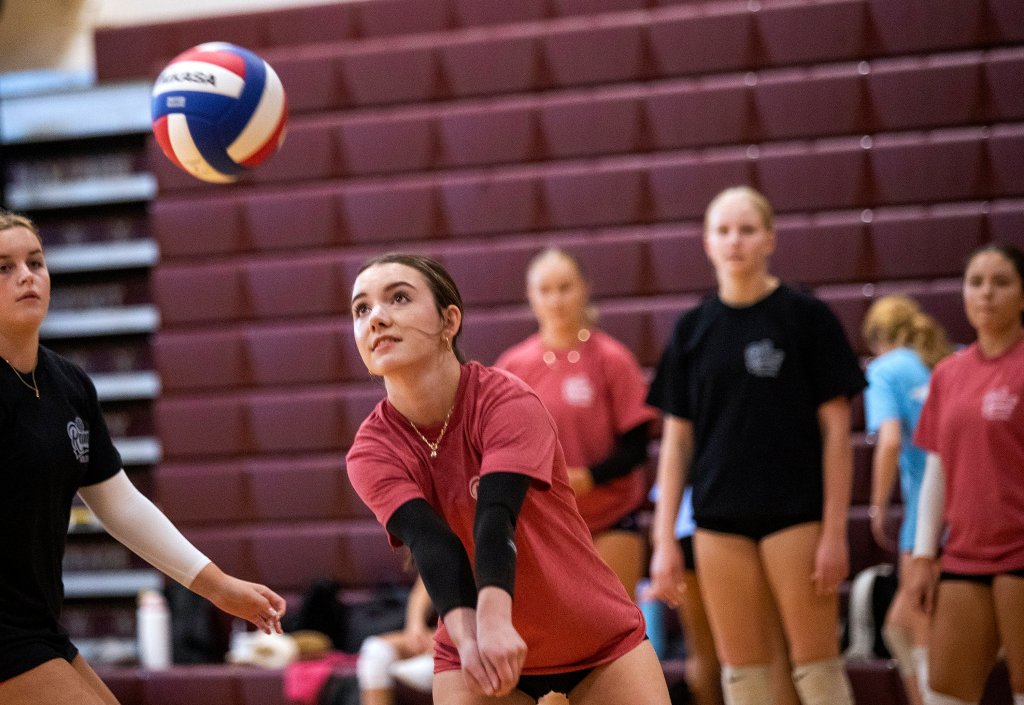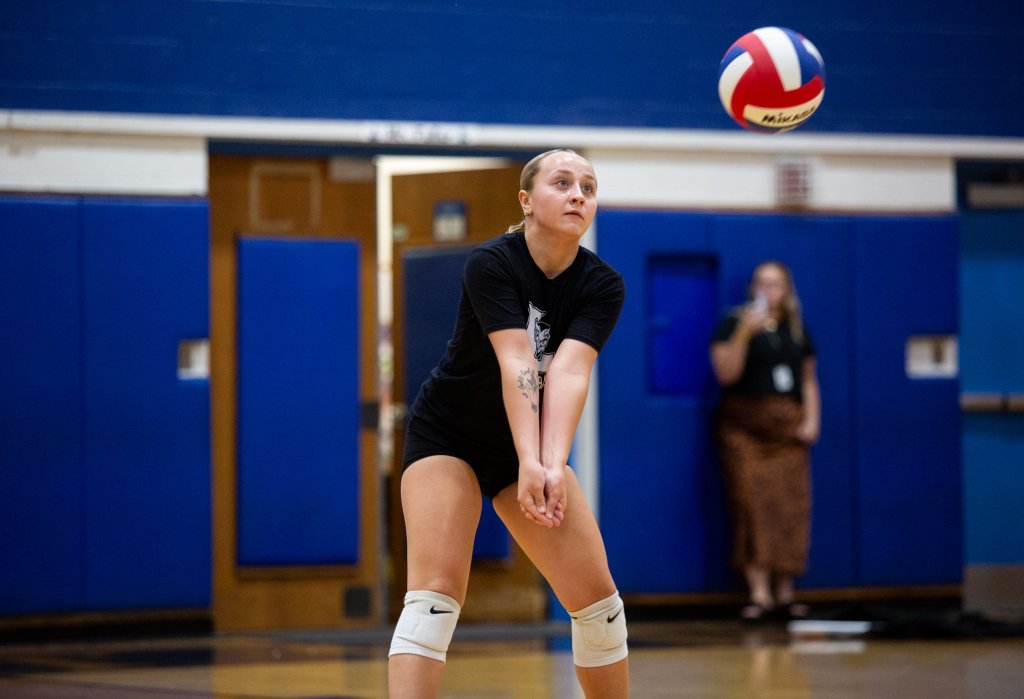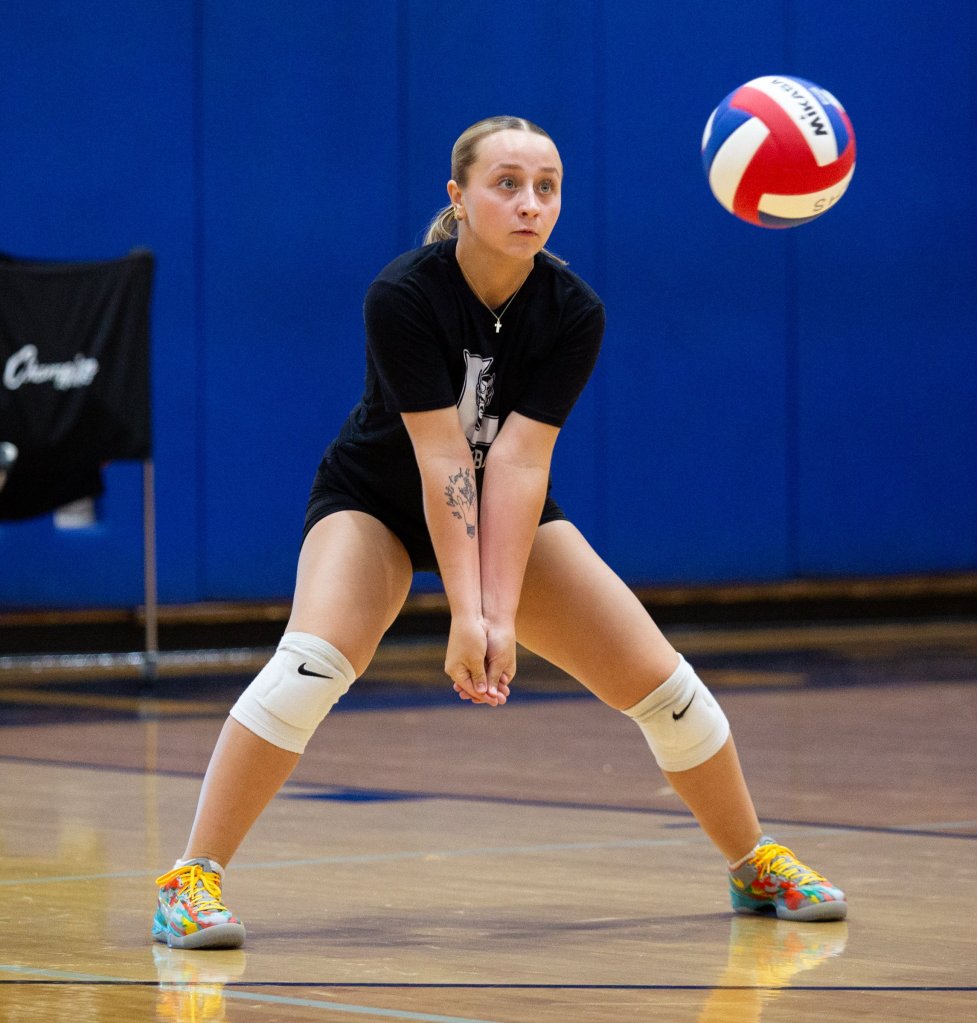
Our Communities. Our Teams. Our Future.
We’re proud to make high school sports coverage free for everyone—because these moments matter. At Maine State Credit Union, we’re here for the people and places that make Maine strong. Let’s Go! Learn more at mainestatecu.org.

It’s easy to notice the big hitters hammering the ball to the floor to earn a point after a long rally in volleyball.
“I feel like when spectators watch volleyball, they’re not like, ‘oh, great pass,’ it’s always, ‘great kill,’” Gorham senior Abby Simcock acknowledged.
But inside the game, say players and coaches across Maine, a team’s success often hinges on strong play from the libero.
A libero is a specialized player who often serves as a critical line of defense by diving to the ground to receive serves or get digs. In a way, liberos are also like a goalie on defense, ensuring the ball does not hit the ground prematurely.
Liberos also wear a different colored jersey, and can sub in without costing the team a substitution. That makes room for both strategy and skill, because coaches can use a well-timed substitution to change the dynamic of a game.
CRUCIAL POSITION
In downeast Maine, Washington Academy is the reigning Class B champion. Head coach Corey Schwinn, who is entering his 11th season, has won three state titles in five years. He said about 40 of the school’s 300 students try out for the team. Twelve make the team and one is designated a libero.
“What I find is that most of the time over the years, players are not really excited about playing libero, because it is not the most glamorous position,” Schwinn said. “It is not a big hitter, and if you do it really well, you don’t get a lot of recognition — unless you have people watching the game that really understand the game — then they can appreciate a really good libero. A libero usually does their job and does it pretty quietly and just goes out there and completely changes the game, takes control of the whole defense, runs the defense.”

Schwinn added that there are a few underclassmen vying for the role after Autumn Baliyant graduated. Despite having several candidates, Schwinn said he prefers to only have one libero per game, because once designated, the libero cannot switch roles.
Additionally, if a team has more than one libero, only one can play per set.
Defending Class A champion Gorham entered the season with senior Addy Simcock as the libero. Coach Emma Tirrell, who is in her ninth season, said the position carries a lot of pressure and respect.
“Especially in our program, I know that the girls that have the libero jersey have a lot of pride in it, and I think that when they make mistakes or aren’t having a good game, embarrassed isn’t the right word, but I think that they’re like, ‘I want to play well, because I want to show that I earned this,’ so the hardest part is living up to the expectation that they’re going to do great,” Tirrell said.
The 5-foot-3 Simcock started playing volleyball in sixth grade through Gorham’s recreational programs. She played with the Maine Juniors Volleyball Club until her sophomore year. As a freshman, she started as a setter, but soon switched to a defensive specialist. She’ll finish her high school career as one, too.
“I’ve always liked back row, I am on the shorter side, so it’s kind of like you have to pick if you are going to be a back row, defensive specialist or libero, or are you going to try and be a setter, which is hard to do short, but you can work your way around,” Simcock said.
Julia Young, a senior, dons the libero jersey for Falmouth. Coach Larry Nichols, who is in his 17th year, said a strong libero is vital for any team with playoff expectations.
“If you’re going to have a team that goes all the way, you’ve got to have a good libero,” he said. “It’s a hot spot, and they’re going to be almost like James Bond: cool, calm and collected. They’re going to get a lot of action, and for a lot of it, they’re not going to be successful because it’s in a hot spot.”
He added that liberos are usually the best passer on the team, with the best mobility. That helps, when a hitter or blocker isn’t as strong of a passer.
“When the libero was added, the fun level of the game and the rallies (improved), because it just made it a lot harder to get points because you had such a good defender in there,” Nichols said.

Lewiston, which also features players from Lisbon, has a senior libero in Ava Marquis. The softball standout tried volleyball as a freshman, citing the similar motions to softball. Her career began as an outside hitter, and then she slowly transitioned to middle back before becoming a defensive specialist. She finally landed at libero as a junior after encouragement from second-year head coach Jennifer Curlee.
“I’m not very tall, I’m only 5-foot-4, so hitting is not my strong suit; defense was my main thing,” Marquis said. “Then Curlee came in, I think she just saw I had potential, so she just asked me if I wanted to do it.”
WHAT MAKES A GOOD LIBERO?
Timing, communication, anticipation and fearlessness are a few of the attributes several coaches and players say are crucial to play the position.
“Good liberos are standing in the right spot before the hitter even makes contact with the ball, because they know where that ball is likely going to go,” said Schwinn, the Washington Academy coach. “They have to be wired a little differently, and I mean that with all due respect, because a good libero prioritizes the ball over their body and they just go make plays, whatever it takes. … They care about getting that ball up in the air above anything else that’s going on.”
Simcock said she has to rely on strong communication, which she embraces. For her, it’s rewarding to give her setters the opportunity to run whatever offense they want to, and she finds pride in providing strong passes so that her teammates can end with a massive hit.
Setters and liberos also need to be two of the strongest players on a team, despite the big hitters receiving much of the glory. Simcock added that a libero is responsible for placing the ball in the correct spot for those massive hits to happen.
“Obviously, I respect good kills, I live for getting a good pass to make sure that kills happen,” she said. “I don’t want to say people don’t understand, but sometimes it can seem easy, like we’re not working too hard. I promise, we really do work hard, we’re really trying to make sure that our offense can run efficiently.”
Tirrell said a good libero will execute plays that some teammates struggle to make. At Gorham, when the libero is “on fire,” she sees the player “doing things that the team wouldn’t be able to do with them.” Often, that’s diving to the floor to dig a ball at the last possible second.
“Something weird about me, I really love sacrificing my body,” Simcock said. “I think it’s so much fun if you love getting down and getting dirty and really going for the ball. Being that person that’s just like, go, go, go, go; I think it’s really special. I don’t know, something about getting a good dive, very rewarding in a sense.”
Simcock added that to be the team’s libero, an athlete has to become familiar with covering themselves in bruises, which she laughed and called her “battle scars.”
“You hustle and sometimes you’ll be like, ‘I got this bruise getting that one good up, I’m proud of myself,’ but I think being libero is so fun. I’m very glad that my volleyball career has led me to this.”
Marquis, Lewiston’s libero, said there’s an advantage in being short, because she’s lower to the ground and can dive far easier than her 6-foot teammates. As a catcher and second baseman in softball, she’s already grown accustomed to diving on the ground. Her favorite plays are getting digs and picking up shorts, when the ball is tipped over the net by opposing blockers.
“It definitely takes a lot of mental toughness, and physical as well, because obviously you’re kind of everywhere,” Marquis said. “I find that I’m doing my best when I’m on my toes, and I feel like I do better when it’s a faster-paced game rather than a slower pace, because I find slower-paced games easier to sit back and not care about what’s going on.”
She added that Curlee is hard on her because she knows the senior can handle it and has the potential to be a game-changing player.
“Liberos just have to be mentally tough and expect that people are going to come at you, and be ready to pick up those hard hits,” Marquis said.

We invite you to add your comments. We encourage a thoughtful exchange of ideas and information on this website. By joining the conversation, you are agreeing to our commenting policy and terms of use. More information is found on our FAQs. You can modify your screen name here.
Comments are managed by our staff during regular business hours Monday through Friday as well as limited hours on Saturday and Sunday. Comments held for moderation outside of those hours may take longer to approve.
Join the Conversation
Please sign into your CentralMaine.com account to participate in conversations below. If you do not have an account, you can register or subscribe. Questions? Please see our FAQs.